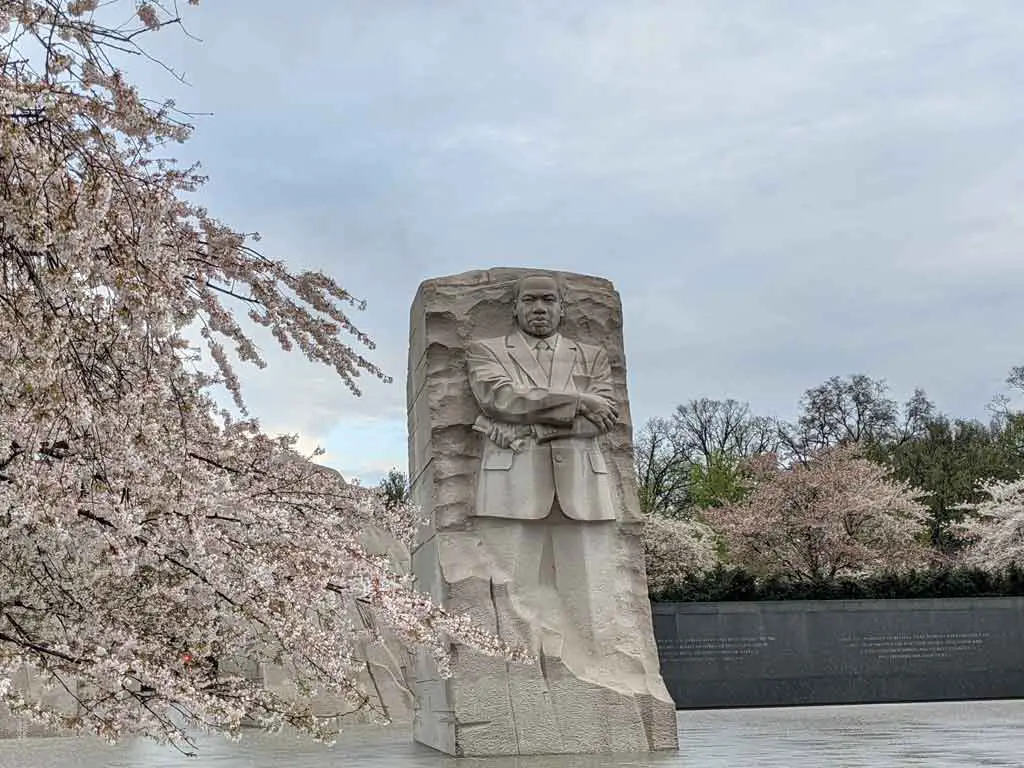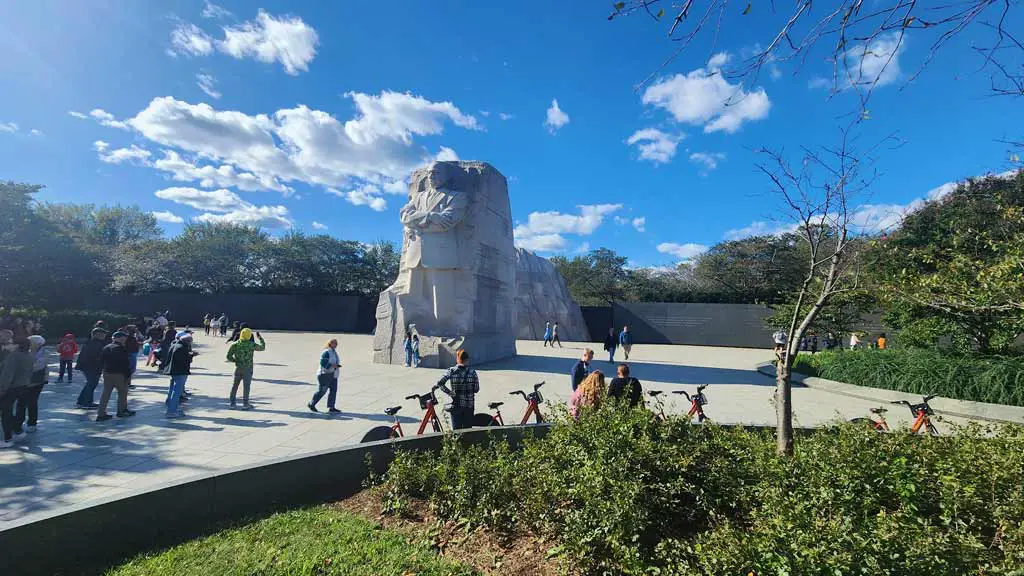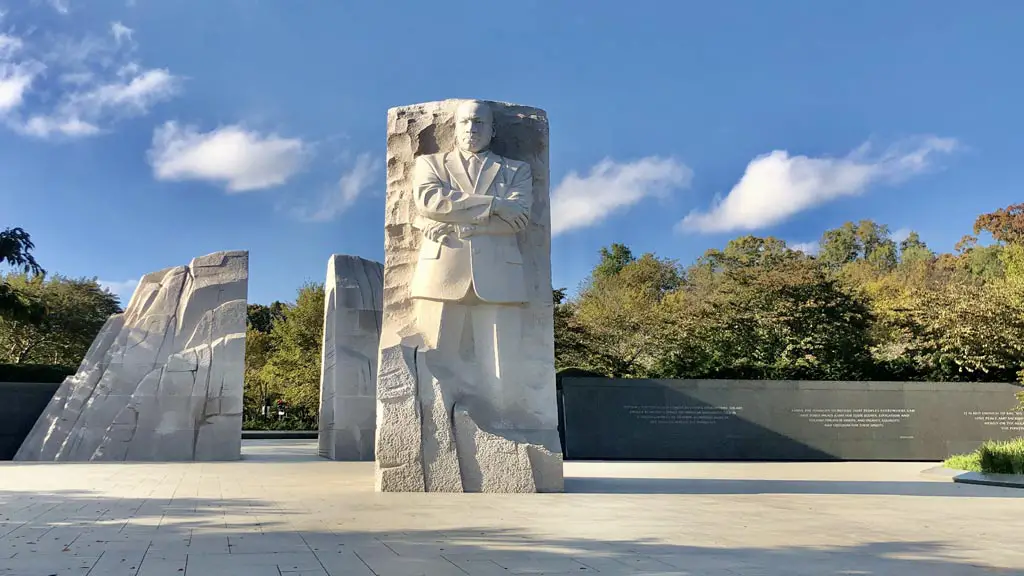Washington, DC played a crucial role in Martin Luther King Jr.’s civil rights efforts, particularly evident in his influential “I Have a Dream” speech.
His advocacy for racial equality and social change was prominently showcased in the capital, shaping American history and pressuring policymakers for widespread impact.
Being the political epicenter of the US, Washington, DC provided King with a significant platform to advance his message on a national scale, greatly enhancing his reach and influence in promoting civil rights and racial equality.
The city’s significance also extended to its symbolic value as the nation’s capital, amplifying the impact of King’s activism and resonating with audiences nationwide.
His strategic decision to focus on Washington, DC underscored the importance of targeting the heart of American governance to drive meaningful societal change.

The Historical Significance of the 1963 March on Washington
The 1963 March on Washington was a pivotal event in the Civil Rights Movement.
King’s “I Have a Dream” Speech at the Lincoln Memorial
At the Lincoln Memorial, Martin Luther King Jr. delivered his iconic “I Have a Dream” speech during the march.
This speech emphasized the dream of a future where racial harmony and equality prevail, touching the hearts of millions and solidifying King’s legacy as a champion of civil rights.
Washington DC holds significant historical importance to Martin Luther King Jr. as it was the site where he delivered his impactful “I Have a Dream” speech at the Lincoln Memorial during a historic march for civil rights.
This momentous event showcased King’s unwavering dedication to advocating for racial harmony and equality.
Impact of the March on Civil Rights Legislation
The 1963 March on Washington played a significant role in influencing the passage of civil rights legislation. The collective voice of the marchers, advocating for equality and justice, resonated across the nation, leading to key legislative achievements such as the Civil Rights Act of 1964.
The march served as a catalyst for change, inspiring policymakers to pursue laws that aimed to dismantle segregation and promote equal rights for all Americans.
Martin Luther King understood the strategic importance of Washington DC as the nation’s capital for advocating civil rights reforms.
By organizing the march in Washington, King aimed to directly impact policymakers and garner national attention for the civil rights movement.
The Role of Washington DC in King’s Activism

Washington, DC played a crucial role in Martin Luther King Jr.’s activism for civil rights and social change. Here are some key aspects of its significance:
Strategic Meetings and Political Engagements
In Washington, DC, King conducted strategic meetings with political leaders, advocating for civil rights reforms. He engaged with policymakers to push for legislative changes that would advance equality for all Americans.
These interactions were instrumental in raising awareness and garnering support for the Civil Rights Movement on a national scale.
King’s presence in Washington, DC was crucial as he strategically met with political leaders to advocate for civil rights reforms and push for legislative changes.
These efforts played a significant role in raising awareness and garnering national support for the Civil Rights Movement.
Nationwide and International Attention
King’s presence in Washington, DC attracted nationwide and international attention to the civil rights cause. His actions in the nation’s capital were widely covered by the media, amplifying the message of equality and justice.
By leveraging the spotlight of DC, King was able to reach a broader audience, mobilizing support not only across the United States but also internationally.
This increased visibility and support played a crucial role in advancing the civil rights movement and putting pressure on lawmakers to enact change.
Ultimately, Washington, DC served as a powerful platform for Martin Luther King Jr. to advocate for his vision of a more equitable society.
Martin Luther Middle King Jr. Memorial in Washington DC

The Martin Luther King Jr. Memorial in Washington, DC is a significant tribute to Dr. King’s legacy and contributions to the civil rights movement. Here are some key points about the memorial:
Symbolism of the Memorial’s Design
The Martin Luther King Jr. Memorial in Washington, DC, embodies the legacy of the leader with features like the “Stone of Hope” sculpture and excerpts of his speeches on surrounding walls promoting equality and justice.
The memorial’s design, with elements like the “Mountain of Despair” and “Stone of Hope,” reflects the struggles and victories of the civil rights movement.
Its strategic location in the nation’s capital enhances the visibility and accessibility of King’s message, ensuring a lasting impact and inspiration for people worldwide.
Inscriptions and Their Significance
The inscriptions at the Martin Luther King Jr. Memorial in Washington, DC, were carefully chosen from his writings and speeches to exemplify his profound teachings and vision for a better society.
They include phrases like “Out of the mountain of despair, a stone of hope,” symbolizing King’s belief in turning challenges into opportunities for hope.
Another notable inscription, “I was a drum major for justice, peace, and righteousness,” underscores King’s dedication to advocating for ethical leadership and social justice, serving as reminders of his enduring legacy and encouraging visitors to contemplate their role in promoting equality and justice.
The Legacy of King’s Speeches in Washington DC
Martin Luther King Jr.’s speeches in Washington, D.C., continue to reverberate, shaping American society to this day with their powerful messages advocating for equality and justice.
Continuing Influence on American Society
King’s speeches in Washington, D.C., have had a lasting impact on American society, fueling movements for civil rights, equality, and social justice.
His words resonate across generations, inspiring individuals and communities to stand up against discrimination and inequality.
Washington, D.C. holds a significant place in Martin Luther King’s legacy due to the pivotal speeches he delivered there. His powerful words continue to ignite passion for civil rights and equality, shaping the course of history.
Educational Programs and Commemorative Events
Educational programs and commemorative events in Washington, D.C., honor King’s legacy by educating the public about his teachings and the importance of equality.
These programs provide insights into King’s life and work, ensuring his message remains relevant and influential in today’s society.
They also serve as a reminder of the progress made towards equality and the ongoing work needed to address social injustices.
Through these initiatives, Washington, D.C. solidifies its position as a hub for honoring Martin Luther King’s impactful contributions.
Frequently Asked Questions
When did MLK visit Washington, DC?
Martin Luther King Jr. visited Washington, DC, and delivered his iconic ‘I Have a Dream’ speech at the March on Washington on August 28, 1963.
Where is MLK’s burial place located?
Martin Luther King Jr. is buried at the Martin Luther King Jr. National Historic Site in Atlanta, Georgia, at the King Center.
Why is Washington, DC significant to Martin Luther King, Jr?
Washington, DC holds significance for Martin Luther King Jr. as it was the location where he delivered his powerful ‘I Have a Dream’ speech during the 1963 March on Washington, advocating for civil rights and equality.
What was the cost of building the MLK Memorial in Washington, DC?
The Martin Luther King Jr. Memorial in Washington, DC, cost around $120 million to construct and stands as a tribute to Dr. King’s legacy and dedication to social justice and civil rights movements.
Conclusion
Washington, DC’s significant role in Martin Luther King Jr.’s civil rights advocacy is highlighted through events such as the March on Washington.
The Martin Luther King Jr. Memorial in the city stands as a powerful symbol of his impact on social justice, inspiring movements for equality in the United States.
Educational programs and events in DC continue to honor King’s legacy and preserve his vision for future generations, making the city a central location for commemorating his influence on civil rights reforms and societal equality.
In addition, Washington, DC served as a pivotal platform for Martin Luther King Jr. to deliver his iconic “I Have a Dream” speech during the March on Washington.
The city’s historical significance in the civil rights movement further solidifies its importance in honoring King’s enduring legacy.




Allison Brice